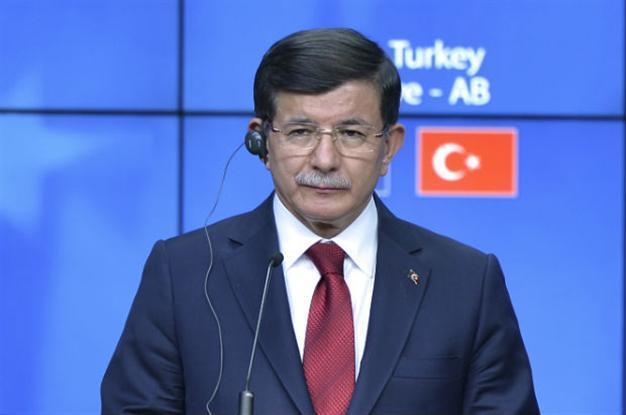Syria-bound intel trucks operation targeted us: Turkish PM
ANKARA

AA photo
Prime Minister Ahmet Davutoğlu has claimed that a legal investigation into Syria-bound intelligence trucks primarily targeted himself, then-Prime Minister Recep Tayyip Erdoğan and top intelligence chief Hakan Fidan.
“One of the primary targets of the incident was me,” Davutoğlu told a group of journalists en route to Brussels from Ankara on Nov. 29.
“I was in Harran on Friday when the operations involving MİT [the National Intelligence Organization] trucks were launched. It took place when an ambassadors’ meeting was being held. Three persons were selected as a target: our then-prime minister, me as the then-foreign minister and our MİT undersecretary. It is an incident which directly painted the three of us as a target,” Davutoğlu said in remarks published in Hürriyet daily on Nov. 30.
“The wiretapping of our room later was also a follow-up in the same process. It was a treacherous activity which was conducted to bring all three of us to the International Criminal Court [ICC]. It is the same gang which wiretapped my room. And those reports are reports which supported this plot,” he said.
The subject of the MİT’s purported arms deliveries to Syria has been high on the country’s agenda in the wake of Turkey’s downing of a Russian jet on Nov. 24, and the arrest of two prominent journalists, daily Cumhuriyet Editor-in-Chief Can Dündar and Ankara Bureau Chief Erdem Gül, on Nov. 26 on charges of collecting and revealing secret documents for espionage and supporting of an armed terrorist organization.
The accusations against Dündar and Gül were based on reports in Cumhuriyet regarding the Syria-bound MİT trucks.
“By stopping MİT trucks and checking what was inside, they announced it to the world through espionage.
What did they say then? They said, ‘These [trucks] are providing weapons for a terrorist organization.’ They exposed the humanitarian assistance which was sent to Bayırbucak Turkmens in this way. They exposed what was sent to the Free Syrian Army [FSA] in this way,” President Recep Tayyip Erdoğan said on Nov. 28.
In January 2014, trucks belonging to MİT were stopped by a prosecutor who sought to have the gendarmerie search the vehicles in the southern province of Adana before they crossed into Syria. Claiming that the trucks were carrying “humanitarian aid to Turkmens” in the war-torn country, the Turkish government accused followers of U.S.-based Muslim preacher Fethullah Gülen in the judiciary and security institutions of illegally ordering the search.
In February 2014, a ban was imposed on the publication of reports about the search, and in April 2015 a Turkish court arrested 17 active soldiers who stopped the trucks.
There has long been speculation that the aid was actually being sent to jihadists in Syria.
As of March 27, 2014, just days before local elections were held in Turkey on March 30, Turkey banned YouTube after the Google-owned video-sharing website was used to spread damaging leaked audio files from a state security meeting debating possible military action in Syria that included false-flag attacks on Turkish soldiers.
The recording, which was posted on YouTube, revealed a top secret conversation between Davutoğlu, Fidan, Foreign Ministry Undersecretary Feridun Sinirlioğlu and then-Deputy Chief of General Staff Gen. Yaşar Güler.
